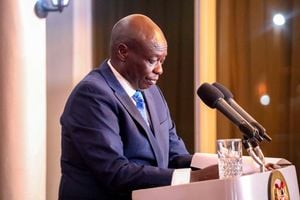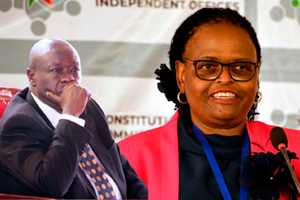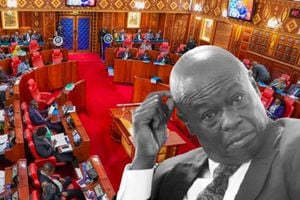Wanga king installed amid controversy

Prince Peter Mumia II of Wanga who was installed on Saturday as the 14th king of the Luhyia’s Wanga kingdom. Photo/JACOB OWITI
What you need to know:
- Ceremony is marked by inordinate rituals and attended by elders from other tribes
Peter Mumia II was on Saturday crowned as the 14th king of the Luhyia’s Wanga kingdom in a ceremony that was boycotted by a section of his family members.
The drawn out ceremony involving inordinate rituals was attended by elders from other tribes.
The new king was decorated with a leopard skin believed to have been worn by his predecessor and received a golden bracelet (Omukasa) reserved for the royalty.
During the ceremony witnessed by thousands of people, the new king sat on a three-legged traditional stool in the coronation shrine.
The prince first waited for more than 14 hours for the remains of Nabongo Shitawa to be retrieved and be reburied before he could be crowned at Matungu shrine.
After the skeleton was retrieved at around 3.30 p.m., there were protests from a section of members of the community who claimed that the remains were not genuine bones of the late King Shitawa.
Francis Wesonga claimed the king was buried with two small pots – one on the head and another bearing traditional liquor at his feet – yet not even traces of the items had been found.
“It’s not practicable to get the bones as it was claimed by those who retrieved the remains without traces of the pots which cannot rot,” he said adding that coronation was no child’s play.
Despite some opposition, the exhumation exercise was done amid song and dance by groups from different parts of the country and beyond the borders.
Traditional oil
The bones were then washed and anointed with special traditional oil before they were wrapped in a raw black skin and taken to Matungu Shrine for reburial.
On arrival, the remains and the prince were sneaked in to the shrine through the back fence near the mausoleum where other kings were reburied.
Children and women were not allowed to attend the re-burial exercise.
The coronation was attended by Mr Kamlesh Pattni, the chairman of House of Traditional Elders of Kenya, Sala Al hajim from Libya and Best Karugisha, queen mother of Toro.
Libya leader Mummar Gadaffi, through his representative Sala Al Hajim, presented a plasma TV, a laptop and desktop computer as gifts.
Earlier on Friday, young men spent the whole night searching for the remains of Nabongo Shitawa who died 36 years ago but could not locate them.
A second team was brought in but also failed to locate the bones by midday yesterday. An earth mover was eventually brought in to help.
The excavation and the reburial of the bones was to precede the installation of the new king.
Marked grave
But why would it take a lot of time to recover bones from a marked grave? That was the mystery that evoked speculations.
Some elders argued that the absence of three sons of the late king was to blame. The three brothers had unsuccessfully moved to court to challenge the installation and the traditional rituals that go with it, arguing that they had to be clear on the administration of the estate of their late father.
A section of elders in the Wanga community who spoke to the Sunday Nation said it was an abomination for the exercise to take such a long time.
Invited guest included Kaya elders from Mijikenda community in Coast Province and Luo Council of Elders chairman Ker Riaga Ogalo and Kikuyu senior elder Samuel Mwangi Thuita.




